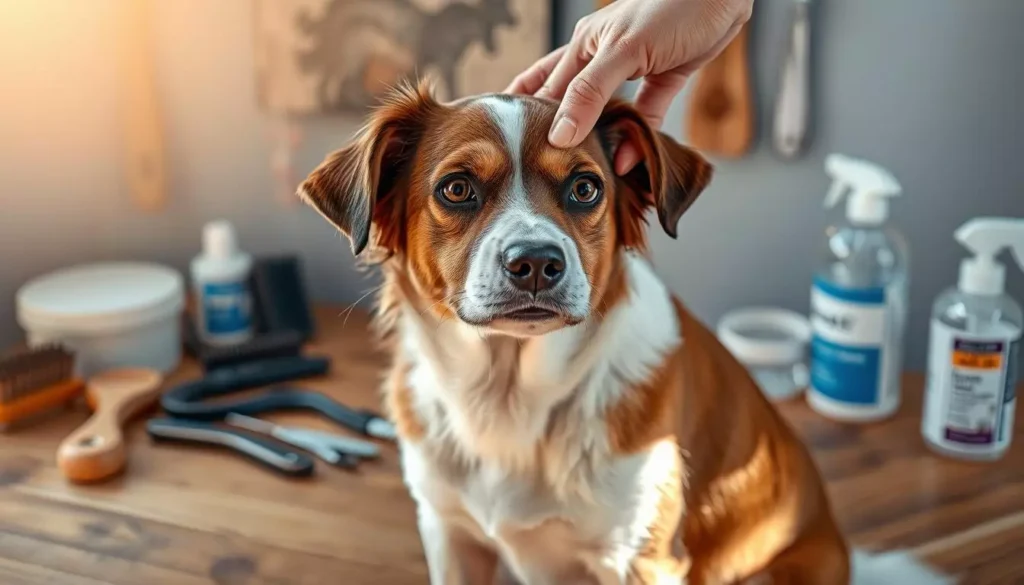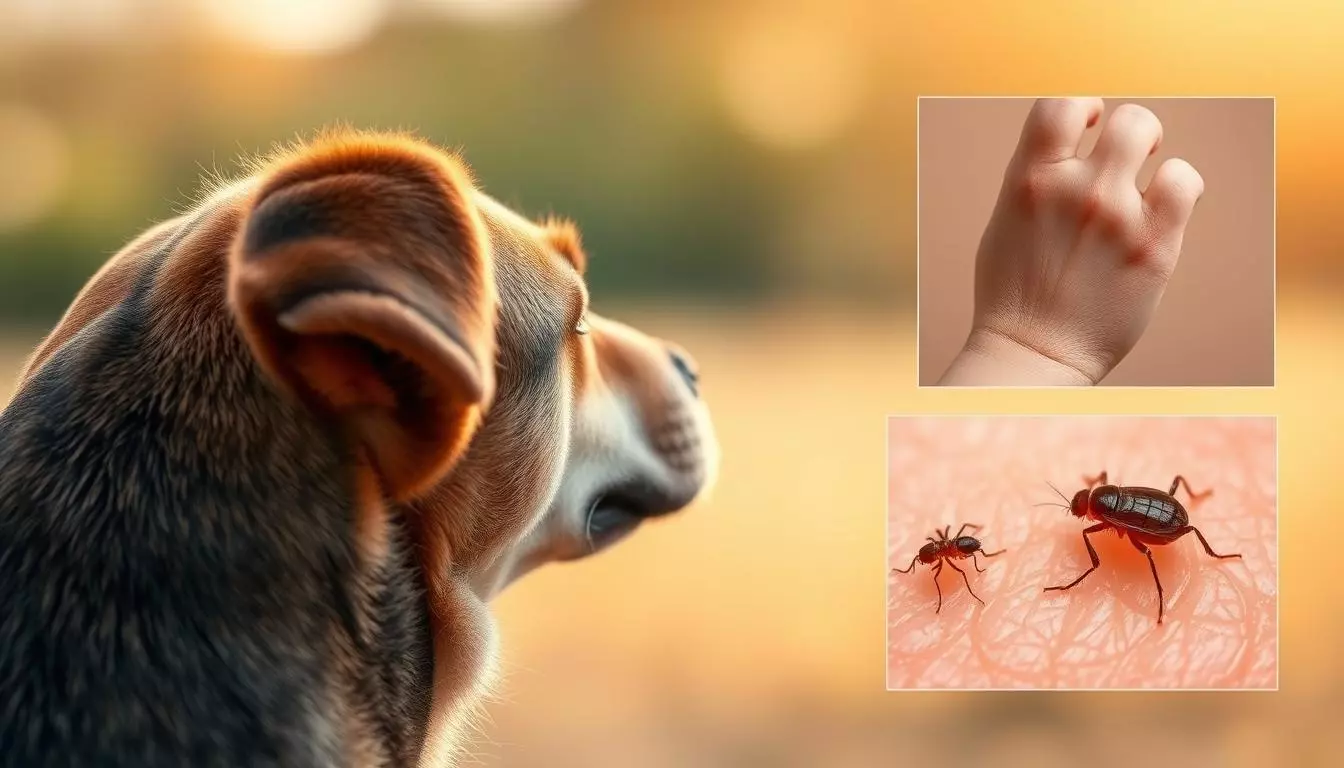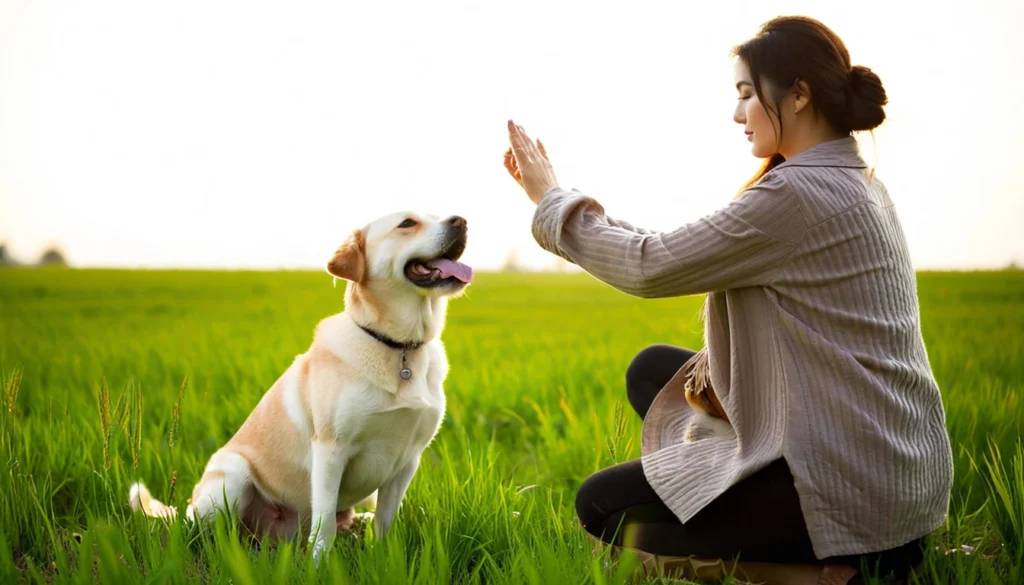As a devoted pet owner, I always watch my furry friend closely. It's alarming when I see my dog scratch his ear and then lick his paw. I wonder if it's just a quirk or a sign of something serious.
Many of us worry about our dogs' health and happiness. It's important to understand these signs. They can show health issues like ear infections or allergies that cause discomfort. In this article, we'll look into why dogs scratch and lick their paws. I'll also share ways to keep them happy and healthy.
Key Takeaways
- Understanding the connection between ear scratching and paw licking can reveal important clues about your dog's health.
- Allergies are a common cause of discomfort in dogs, leading to behaviors like scratching and licking.
- Ear infections in dogs often manifest through symptoms such as ear scratching.
- Paw licking behavior may indicate underlying issues, requiring further investigation.
- Regular ear care can prevent many health issues affecting your dog's ears.
- Knowing when to consult a veterinarian is crucial for your dog's overall well-being.
Understanding Canine Behavior Signs
Every dog owner needs to understand canine behavior signs. These signs can show many things, like emotions or health issues. For example, if my dog scratches or licks too much, it might mean they have allergies or are stressed.
By paying attention to these behaviors, I get to know how my pet is feeling. This helps us bond better and ensures they get the care they need on time.
Studies on dog behavior show that knowing about health indicators is key. Each dog is unique, but signs of discomfort are common. These include paw licking or ear scratching.
These behaviors often hide underlying problems. If I don't watch closely, I might miss them.
By watching my dog closely and learning about their behavior, I can meet their needs better. This not only improves their health but also makes them happier.
Common Reasons for Dogs to Scratch Their Ears
As a dog owner, I've learned that several things can make dogs scratch their ears. Allergies are a big one. Things like pollen, dust, or certain foods can make dogs itch.
Ear infections are another big problem. They can make ears red, swollen, and smelly. It's important to watch for these signs to help your dog.
Parasites like ear mites can also make dogs scratch a lot. These tiny bugs can really irritate a dog's ears. Regular ear care and vet visits can help prevent these problems.

Dog Scratches Ear Then Licks Paw: What It Indicates
Seeing a dog scratch its ears and then lick its paws can worry pet owners. This behavior might show health problems that need attention. Knowing the causes helps owners take better care of their dogs.
Allergies: A Primary Cause
Allergies often cause dogs to scratch their ears and lick their paws. They might react to food or environmental allergens like pollen. This discomfort makes them scratch their ears hard.
Ear Infections in Dogs
Dogs scratching their ears hard might have ear infections. These infections can come from allergies, causing pain and inflammation. Look for signs like redness, smell, or discharge to get them treated quickly.
Dry Skin Issues and Hormonal Imbalances
Dry skin in dogs can be due to weather or hormonal changes. Dry skin makes them scratch, especially around the ears. They might lick their paws to soothe the itch. Proper grooming and vet care can help keep their skin healthy.
Paw Licking Behavior: What to Look For
Paw licking in dogs is not just a funny habit. It can show health issues that need attention. I watch my dog's licking closely to understand their health better.
I look for signs of pain like redness, swelling, or sores on their paws. These signs might mean problems like pododermatitis or allergies. It's important to watch for these signs and act fast.
Identifying Conditions Through Paw Licking
Spotting health issues through paw licking needs careful watching and knowing my dog's life. I think about things like allergies, irritants, or stress. Every dog reacts differently, so it's key to track their habits closely.
Common Causes of Paw Licking in Dogs
Paw licking can be caused by allergies, irritants, or boredom. Environmental factors often play a big part. For example, allergies can cause more licking in certain seasons, while cleaning chemicals can irritate their paws.
Knowing these causes helps me keep my dog's paws healthy and irritation-free.

How to Care for Your Dog's Ears
Caring for your dog's ears is key to their health and avoiding infections. Regular checks and cleanings help spot problems early. I start with these tips to keep my dog comfortable.
Choosing the right ear cleaner is vital. I use a vet-approved one to safely clean out dirt, wax, and buildup. I gently squeeze the cleaner into the ear canal, then massage the ear base to spread it.
Having cotton balls or gauze ready is helpful. I use them to remove extra cleaner and debris. But, I avoid putting anything too deep in the ear to avoid harm or pushing debris further.
Keeping a regular cleaning schedule is good for your pet. Most dogs need their ears cleaned once a month. Some breeds with floppy ears might need more often. So, I always check with my vet for advice based on my dog's breed and needs.
By following these easy tips and using the right cleaning methods, I keep my dog's ears healthy and comfy.
Effective Dog Grooming Tips to Prevent Issues
As a dog owner, I always look for the best grooming tips. Regular grooming keeps my dog's coat shiny and helps prevent ear infections. A clean coat and ears reduce the risk of irritants that can cause scratching.
I brush my dog's coat often to remove dirt and tangles. This simple act is great for grooming and health. It helps me catch any signs of redness or swelling early.
Checking the ears regularly is also key. I make sure they are clean and dry. This prevents ear infections caused by trapped moisture or debris.
Bathing my dog with a gentle shampoo every month keeps them fresh. It's a special bonding time and helps prevent skin issues. I choose products made for dogs to keep their skin healthy and free from irritation.
Being proactive about my dog's hygiene helps me spot any discomfort. These grooming tips not only make my pet look good but also improve their health. Here's to a happy, healthy pup!

When to Consult Your Veterinarian
Knowing when to see an ear care veterinarian is key for your dog's health. If your dog keeps scratching or licking, it might mean there's a problem. I make sure to catch these signs early to get my dog the care they need.
Signs that Require Immediate Attention
As a pet owner, I know which behaviors mean it's time to see the vet. Some signs include:
- Excessive scratching that becomes distressing
- Visible irritation or inflammation around the ears and paws
- Changes in normal behavior, such as increased aggression or lethargy
- Unusual odors emanating from the ears or paws
- Discharge or fluid leaking from the ears
If you see any of these signs, it's time to take your dog to the vet. Quick action can help catch problems early and improve treatment outcomes.
Diagnostic Procedures for Ear Problems
At the vet, a thorough check-up is usually done. The vet might do:
- Visual checks for signs of infection or parasites
- Microscopic analysis through swabbing to identify infections
- Testing for allergies that may be contributing to the symptoms
These steps help the vet create a treatment plan just for your dog. This ensures they get the best care possible.
Treating Ear Problems in Dogs
As a dog owner, I know how worried I get about my dog's ear issues. It's important to figure out what's wrong with their ears first. Then, I can look into different treatments to help their ears get better.
There are many ways to treat ear problems, like medicines for infections, special ointments, and ear cleaners. These help make my dog feel better and heal faster. Working with a vet is key to making sure I'm doing everything right for my dog.
Even though I can do some things at home, I always need to check in with my vet. They can give me specific advice for my dog's ear problems. This helps keep my dog's ears healthy and stops future problems.
Preventative Measures for Dog Ear Care
Keeping my dog's ears healthy is a big job. I start by cleaning their ears regularly. This helps prevent problems before they happen. I use a solution approved by vets to clean out wax.
After my dog swims or gets a bath, I make sure to dry their ears well. Moisture can cause infections, so I use a soft towel. I also try to keep them away from things that might make their ears itch.
I also keep our home clean to help my dog's ears stay healthy. Vacuuming often helps get rid of dust and other things that could bother their ears. By doing these things, I help keep my dog's ears safe from problems.
| Preventative Measures | Description |
|---|---|
| Regular Cleaning | Use vet-approved ear cleaning solutions weekly. |
| Dry Ears After Water Activities | Gently dry ears following baths or swimming. |
| Avoiding Allergens | Limit exposure to common allergens. |
| Maintain a Clean Environment | Regularly vacuum and clean living areas. |
Addressing Underlying Causes of Paw Licking
Understanding why dogs lick their paws is key to solving the problem. It could be due to allergies, irritants, or even behavioral issues. A vet can help figure out what's causing the licking through tests.
After finding the cause, you can start fixing it. This might mean changing your dog's food, using special products, or making their home safer. Knowing why your dog licks their paws helps you act fast. This keeps your dog happy and healthy.
Conclusion
Knowing why dogs scratch their ears and lick their paws is key for pet owners. It shows how our pets are doing and why regular care is so important. By noticing these signs, I can spot health problems early.
By taking good care of my dog, like grooming and watching their habits, I can keep them healthy. This way, my dog can stay happy and comfortable. Knowing about dog health helps me act fast to keep my pet well.
My dedication to my dog's health makes our time together joyful. Learning about dog health helps me create a safe and caring space. This way, I can prevent problems and keep my dog happy and healthy.




